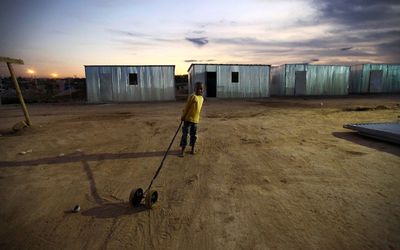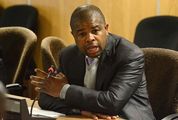CONSERVATIVES who blame poor people for their poverty have a new friend — the African National Congress (ANC) and its allies. A statement issued after the alliance summit this month is creating great excitement among some commentators: they see it is a huge policy shift that shows that the governing party is finally on the right track. Poor people are likely to have a different view; the statement labels them unfairly and suggests that the ANC has turned its back on them.
The statement complains that the "resourcefulness" of South Africans has become "weakened by a message that ‘the state will deliver’".
It adds that "communities" must be "mobilised to appreciate that freedom comes with rights and responsibilities". South African Communist Party spokesman Alex Mashilo explains that this means that people should not "wait for the government truck to arrive", or for services to come, but must "take charge of their own development". All of which suggests that the ANC, having been ditched by the black middle class, now wants the poor to reject it too.
The statement paints a false picture of poor people — and of this country. Anyone who is familiar with grassroots reality here knows that the country is not filled with poor people hanging about, waiting for government handouts.
Study after study has shown that the greatest wish of most poor people is to work — because most cannot find formal jobs, they find ways to work informally. Foreign visitors who visit townships tend to remark on how much energy and activity they see: our local elites don’t notice it because they believe economic activity happens only in formal companies.
The idea that the poor have no idea of "rights and responsibilities" shows a similar bias. It presumably refers, among other things, to the fact that people demonstrate or strike. So it blames the poor’s failure to understand how "civilised society" works, not the refusal of some managers and municipal officials, elected and otherwise, to take grievances seriously.
Perhaps the biggest myth of all is the suggestion that people who receive public support lose their "resourcefulness". The evidence shows the opposite.
Social grants make people more resourceful — the productive uses to which they are put range from starting micro-businesses to paying school teachers who might otherwise leave.
In any society, telling the poor to fend for themselves will produce more poverty. Here, this is even more likely because there is no chance that the formal job market will absorb most job-seekers for decades. Whether or not people who must operate outside the formal market become productive depends on the government’s ability to provide services and facilities.
How do Mashilo and his supporters believe poor people are going to provide themselves with the education, health, transport and safety they need? Given this, the ANC alliance statement is less a policy than an attempt to pass the buck — it sounds as if a government that has given up on trying to beat poverty is telling poor people they had better fend for themselves.
Those who applaud the statement claim that the government does not have enough money to deal with all our problems and must explain this to the people. This ignores evidence that poor people never expected the government to do everything.
As early as the mid-1990s, research showed that people at the grassroots were very aware of the limits on what the government can provide — nothing has happened since to boost expectations.
And it also ignores the reality that there is much more that can be done with available resources to tackle these problems. So, if the statement is a shift, it is one that will take us further away from growth that includes everyone.
The statement also illustrates a great irony — that the ANC, often seen by people in the racial minorities as a left-wing menace, seems to be moving decisively to the right. That the poor should fix their own problems is a favourite theme of US Republicans; add to it the ANC’s interest in imposing unelected traditional authorities on rural people, and a rightward trend emerges. The only reason this goes unnoticed is our racial politics: a party that wants (in theory) to change the racial power balance is seen as radical even when it is moving right.
Whatever your view of the ANC, the country needs a serious debate on how to use the resources we have to begin beating poverty. Passing the buck to the poor and pulling a rug from beneath their feet contributes nothing to that discussion.
• Friedman is director of the Centre for the Study of Democracy

A young boy plays with his cart in the temporary housing settlement in Riemvasmaak, the poorest township in Oudtshoorn. Picture: THE TIMES
CONSERVATIVES who blame poor people for their poverty have a new friend — the African National Congress (ANC) and its allies. A statement issued after the alliance summit this month is creating great excitement among some commentators: they see it is a huge policy shift that shows that the governing party is finally on the right track. Poor people are likely to have a different view; the statement labels them unfairly and suggests that the ANC has turned its back on them.
The statement complains that the "resourcefulness" of South Africans has become "weakened by a message that ‘the state will deliver’".
It adds that "communities" must be "mobilised to appreciate that freedom comes with rights and responsibilities". South African Communist Party spokesman Alex Mashilo explains that this means that people should not "wait for the government truck to arrive", or for services to come, but must "take charge of their own development". All of which suggests that the ANC, having been ditched by the black middle class, now wants the poor to reject it too.
The statement paints a false picture of poor people — and of this country. Anyone who is familiar with grassroots reality here knows that the country is not filled with poor people hanging about, waiting for government handouts.
Study after study has shown that the greatest wish of most poor people is to work — because most cannot find formal jobs, they find ways to work informally. Foreign visitors who visit townships tend to remark on how much energy and activity they see: our local elites don’t notice it because they believe economic activity happens only in formal companies.
The idea that the poor have no idea of "rights and responsibilities" shows a similar bias. It presumably refers, among other things, to the fact that people demonstrate or strike. So it blames the poor’s failure to understand how "civilised society" works, not the refusal of some managers and municipal officials, elected and otherwise, to take grievances seriously.
Perhaps the biggest myth of all is the suggestion that people who receive public support lose their "resourcefulness". The evidence shows the opposite.
Social grants make people more resourceful — the productive uses to which they are put range from starting micro-businesses to paying school teachers who might otherwise leave.
In any society, telling the poor to fend for themselves will produce more poverty. Here, this is even more likely because there is no chance that the formal job market will absorb most job-seekers for decades. Whether or not people who must operate outside the formal market become productive depends on the government’s ability to provide services and facilities.
How do Mashilo and his supporters believe poor people are going to provide themselves with the education, health, transport and safety they need? Given this, the ANC alliance statement is less a policy than an attempt to pass the buck — it sounds as if a government that has given up on trying to beat poverty is telling poor people they had better fend for themselves.
Those who applaud the statement claim that the government does not have enough money to deal with all our problems and must explain this to the people. This ignores evidence that poor people never expected the government to do everything.
As early as the mid-1990s, research showed that people at the grassroots were very aware of the limits on what the government can provide — nothing has happened since to boost expectations.
And it also ignores the reality that there is much more that can be done with available resources to tackle these problems. So, if the statement is a shift, it is one that will take us further away from growth that includes everyone.
The statement also illustrates a great irony — that the ANC, often seen by people in the racial minorities as a left-wing menace, seems to be moving decisively to the right. That the poor should fix their own problems is a favourite theme of US Republicans; add to it the ANC’s interest in imposing unelected traditional authorities on rural people, and a rightward trend emerges. The only reason this goes unnoticed is our racial politics: a party that wants (in theory) to change the racial power balance is seen as radical even when it is moving right.
Whatever your view of the ANC, the country needs a serious debate on how to use the resources we have to begin beating poverty. Passing the buck to the poor and pulling a rug from beneath their feet contributes nothing to that discussion.
• Friedman is director of the Centre for the Study of Democracy





















Post a comment